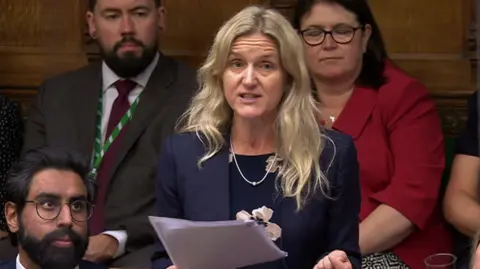In recent debates within the House of Commons, Members of Parliament (MPs) have been discussing important amendments to the Assisted Dying Bill aimed at allowing terminally ill adults in England and Wales to seek medical assistance in dying. The proposed legislation specifically caters to adults with less than six months to live, and its implications have sparked significant discussion and concern among legislators and the public alike.
A key point of contention is a proposed ban on organizations advertising assisted dying services. This amendment aims to ensure that vulnerable individuals do not feel coerced or encouraged into making irreversible decisions about their lives due to external pressures. Other crucial issues under discussion include the regulations regarding substances or devices permissible for use in assisted dying, as well as the role of coroners in overseeing these cases to prevent abuse or misconduct.
Since the bill was initially approved in November with a robust majority of 55 votes, there has been a notable shift in the sentiment among some MPs. Reports indicate that at least a dozen legislators who previously supported the bill or abstained during the vote are now likely to oppose it, reflecting an evolving perspective on the moral and ethical dimensions of assisted dying legislation. Nonetheless, proponents of the bill remain optimistic about its future, asserting their belief that it will successfully navigate parliamentary hurdles to eventually become law.
Should the bill continue to progress through the House of Commons undeterred, it is expected to face additional scrutiny in the House of Lords, where various amendments might be proposed to further refine its content. During the latest discussions, a number of amendments were floated, highlighting MPs’ desire to strike a balance between patient autonomy and safeguarding vulnerable individuals. Notable proposals included measures to ensure that no medical professional would be compelled to participate in assisted dying against their will, as well as requirements for thorough medical evaluations preceding any act of assisted death.
An amendment put forth by Labour MP Kim Leadbeater garnered attention as it would grant ministers the authority to create exceptions to the advertising ban in the future. However, this aspect has received pushback from fellow Labour MP Paul Waugh, who argued that such measures could lead to potential misuse or undue influence stemming from state-endorsed public information campaigns. Conversely, another Labour MP, Tony Vaughan, contended that such flexibilities were necessary to adapt to advancements in societal views on assisted dying.
Additionally, Conservative MP Rebecca Smith has emphasized the need for a coroner’s investigation into any assisted deaths, citing concerns over ensuring accountability and identifying cases of potential malpractice. Meanwhile, Green MP Ellie Chowns has countered that the proposed oversight would unnecessarily complicate a process already imbued with scrutiny, given the nature of assisted dying under the new regulations.
Debates continued intensively, and if MPs do not finalize the amendments by the set deadline of 2:30 BST, further discussions are slated for June 20, allowing for a deeper examination of the nuances of the Bill. Protesters advocating for both facets of the argument have been present outside Parliament, reflecting the heightened emotions surrounding this societal issue. Disability advocate George Fielding of the Not Dead Yet UK campaign has voiced concerns that the bill might inadvertently pressure the disabled community into feeling like a burden to society, thus complicating the broader conversation surrounding personal choice and quality of life.
In conjunction with these discussions, Kim Leadbeater in a letter expressed confidence in the potential of the bill to undergo the necessary refinements, striving to create “the best and safest bill possible”. As debates on this influential matter progress, it is crucial for the legislators to balance compassion with strict oversight, ensuring protection for the vulnerable while respecting individual autonomy in end-of-life choices.



